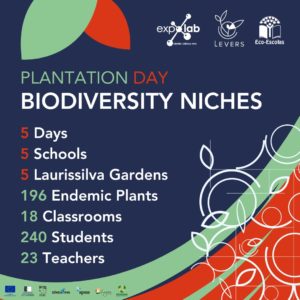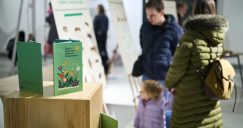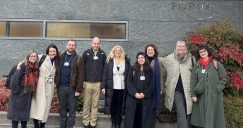Project-based learning for climate justice
School Playgrounds Come to Life with the “Biodiversity Niches” Project
- Article, Educational resource, Portugal

During the 2024–2025 school year, five schools on São Miguel Island, in the Azores archipelago, actively participated in the Portuguese Learning Venture by developing the educational initiative “Biodiversity Niches”. This project aimed to foster deeper ecological awareness within school communities through the creation of Laurissilva Gardens in schoolyards — a concrete action promoting both biodiversity conservation and climate change mitigation.
Coordinated by Expolab – Centro Ciência Viva, the initiative involved students, teachers, and a wide range of local partners in an integrated approach to environmental education, citizen science, and community engagement. Inspired by the Laurissilva forest — one of the most emblematic and resilient ecosystems of the Macaronesia region — students were challenged to explore and value the ecosystem services provided by native biodiversity.
From theory to action: gardens that teach
Throughout the year, students took part in hands-on, interdisciplinary activities. Highlights included field trips to Laurissilva forest areas, where they could observe endemic species in their natural habitats and understand their ecological significance. Back at school, each Eco-school project designed and planted their own garden, using native species with the technical support of local experts.
These activities were complemented by dialogues with researchers, training sessions for teachers, and ongoing ecological monitoring of the gardens. At the end of the school year, students presented their projects to the broader school community and rainsing the LEVERS flag, alongside the Eco-School one.
A collaborative network for climate action
The “Biodiversity Niches” project was made possible through the close collaboration of several local partners, who contributed technical expertise, logistical support, and community involvement. Key partners included SPEA – Portuguese Society for the Study of Birds, the Forestry Service of Ponta Delgada – Regional Directorate of Forestry Resources and Land Management, the Municipalities of Lagoa and Ponta Delgada, the CEFAL – Environmental Education and Training Centre of Lagoa, MUSAMI – Municipal Environmental Operations, the Parish Councils of São Pedro and Ginetes, and CIBIO-Azores of the University of the Azores.
As part of the project, accredited training sessions on “Biodiversity and Climate Change” were delivered to the participating teachers, along with other educators across São Miguel. These sessions were designed to strengthen the goals of the LEVERS project and the Portuguese Learning Venture — especially the goal of building resilient local learning ecosystems. In addition, SPEA Azores provided specialized training on Laurissilva Garden Monitoring, equipping schools with tools to continue monitoring and caring for their green spaces beyond the life of the project.
Learning that transforms
The LEVERS project is based on the belief that “actions drive beliefs”. With this in mind, the Portuguese Learning Venture seeks to empower schools as catalysts for climate action, by promoting experiential learning and encouraging young people to take active roles in transforming their local environments.
By placing biodiversity at the center of the educational process, the “Biodiversity Niches” project fostered not only ecological literacy, but also new relationships between schools, communities, and nature. More than just gardens, these schools created living spaces of encounter, care, and hope — seeds for a more just and sustainable future.









